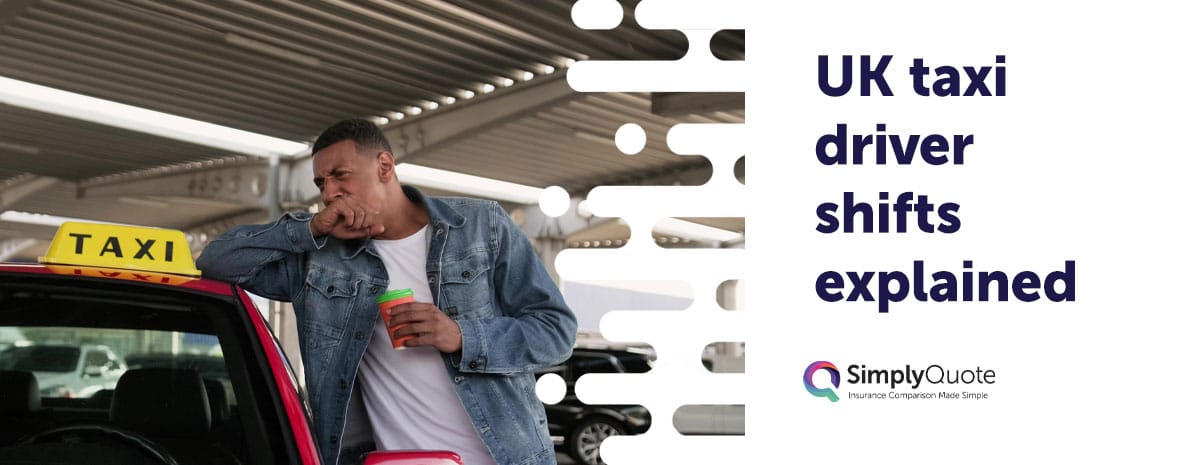UK taxi driver shifts explained
Most private hire taxi drivers are self-employed in the UK, giving them the flexibility to choose their own working hours. Some prefer to capitalise on peak times such as weekends or bank holidays while others opt for a more traditional 9 to 5 schedule.
For those running a taxi company, the focus is clear: work more hours to earn more money.
But what exactly are considered ‘normal’ working hours and what are the risks associated with burning the midnight oil? Also, are there any health and safety regulations for this in the UK?
Luckily, SimplyQuote answers all of the above – and more.

What are usual taxi driver shifts in the UK?
According to the National Careers Service, most drivers work between 41 and 43 hours per week. A taxi driver typically has longer working hours, often during peak times like:
- Early morning/late at night – catering to commuters
- Friday and Saturday nights – high demand due to nightlife activities
- Bank holidays – increased activity
These periods tend to be busier for passengers, leading to higher demand for taxi services. Self-employed private hire drivers adjust their driving hours to cater to these demands, often leading to working longer hours on busy days and shorter hours when business is slow.
Looking for cheap taxi insurance? Get your quote today!
Get QuotesAre there taxi driving regulations in the UK?
Self-employed taxi drivers, or private hire drivers, are not subject to the same driving hour regulations as commercial drivers in the UK.
Commercial drivers, like HGV operators, must adhere to strict driving regulations that ensure a 45-minute break for every 4.5 hours they drive. Licensed taxi drivers, like public hire taxis/hackney carriage operators, should not drive longer than 10 hours within 24 hours – this is more a guideline than a set-in-stone rule.
Since a private hire driver is essentially their own boss, they often increase their hours to boost revenue streams. While longer shifts are financially beneficial, drivers must take regular breaks to avoid fatigue. The responsibility to manage your health and well-being falls solely on your shoulders, for both your and your passengers’ safety.
What are the risks of working long taxi shifts?
There are many risks associated with working long hours, from the increased risk of road-related accidents and feelings of loneliness to paying higher prices on your private hire taxi insurance policy.
Let’s take a closer look:
Physical risks
- Fatigue: Extended hours behind the wheel can lead to driver fatigue, increasing the risk of accidents. Ongoing tiredness can be a significant contributor to stress, burnout, anxiety, and a host of other health issues.
- Passenger safety: A taxi driver offers a public service, which means you are responsible for passengers in your care. You are accountable for public liability damages if you are in an accident caused by exhaustion from working long hours.
- Road hazards: Longer shifts often mean you operate in the early mornings or late nights, increasing exposure to road hazards. Poor road conditions, especially in inclement weather, are harder to see and avoid when working during darker times of the day/night.
- Musculoskeletal problems: Prolonged sitting can cause back pain, neck stiffness and other muscular issues.
- Increased risk of cardiovascular issues: Taxi drivers are at higher risk of developing obesity and cardiovascular diseases (diabetes, high blood pressure, etc.) due to reduced physical activity.
- Eye strain: Staring at the road for long periods can strain your eyes.
Mental risks
- Stress: The constant pressure of meeting customer demands, navigating congested areas, managing finances and dealing with difficult passengers can be stressful and overwhelming.
- Isolation: Working long hours alone can contribute to feelings of loneliness.
- Burnout: The combination of physical and mental strain can eventually lead to burnout – complete emotional exhaustion.
- Higher running costs: There is more wear and tear on your vehicle the more you drive it. Not only do you have a higher fuel bill but vehicle maintenance and upkeep costs are generally more frequent too.
- Higher taxi insurance premiums: Most insurance providers base your premiums on your average annual mileage. This means you may have higher insurance fees when spending more time on the road.
Financial risks
How can taxi drivers manage working longer hours?
Taxi drivers, whether they’re public or private hire drivers, must manage their own hours to avoid fatigue. Here are a few suggestions:
- Get at least seven to eight hours of sleep before your shift begins.
- Eat a balanced diet to ensure you have enough energy to tackle the day.
- Regularly exercise when off-duty to keep muscles strong and supple.
- Take regular breaks in between passenger pick-ups. This helps reduce eye strain and injuries, and avoids any potential accidents.
- Seek support if you’re experiencing stress, fatigue, or burnout. It’s best to avoid driving when feeling overwhelmed or exhausted.
Final thoughts
As you can see, the average taxi driver works between 41 and 43 hours per week. Their shifts largely depend on taxi service demand in the area, generally falling over weekends or holiday periods.
While no rules regulate taxi driver shifts in the UK, it’s best practice to balance longer days with shorter working hours. This ensures you avoid burnout and driver fatigue, significantly reducing your chances of being involved in an accident.
Being a responsible taxi driver ensures both you and your passengers are safe while on the road and typically means you’ll pay lower insurance premiums on your vehicle.
Happy driving!
Frequently Asked Questions
It’s not uncommon for many drivers to work 14-hour shifts, especially over peak periods such as weekends or bank holidays. However, working these durations is not advisable as it can lead to driver fatigue, increasing the risk of accidents. It’s best practice to balance longer days with time off to ensure your and your passengers’ safety.
Taxi driving can be a profitable business in the UK, with salaries ranging from £20,000 to £30,000 per annum. You might be interested in [How profitable is taxi business] next.
To be a UK taxi driver costs between £1,000 and £1,740, excluding annual taxi insurance fees. You might find this article helpful: How much does it cost to be a taxi driver in the UK?
You must be a registered UK private hire driver to legally transport passengers. A few requirements include:
- A valid UK/EU driving licence
- A valid taxi operator licence – England and Wales; Scotland; Northern Ireland
- Your own vehicle
- Private hire taxi insurance
- Deemed medically fit to drive
Bonus read: How To Become An Uber Driver In The UK
